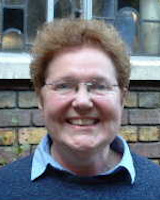
Brenda Harrison
Biography
Brenda Harrison was an active member of the Evangelical Fellowship for Lesbian and Gay Christians (www.eflgc.org.uk) beginning in 1987, serving as co-convenor for several years from 1997. Together with Tony Green and Jeremy Innes, she researched the so called "ex-gay" movement in the United Kingdom for three years from 1992, publishing the Report "Not For Turning" in 1996.
Following early retirement in 2003 from a career in the UK Immigration Service, she became Administrator for Changing Attitude, a charity founded in 1985 by Revd Colin Coward, working for LGBT affirmation within the Anglican Communion (www.changingattitude.org.uk).
In 1998 Brenda was elected Co-President of the European Forum of Lesbian and Gay Christian Groups (www.euroforumlgbtchristians.eu), serving in this capacity until 2004, and again from 2006. She attended the World Council of Churches’ General Assemblies in 1998 in Zimbabwe and 2006 in Brazil, delivering workshops on LGBT sexuality.
Brenda was born in London in 1949. She came to faith in a Baptist church, and was a member of several independent evangelical churches until she became an Anglican in 1979. She was an active member of the local parish church and diocese in Surrey. Brenda died on February 24, 2010 after a long struggle with cancer. She is survived by her long-time partner, Pam Harrison.
Her friend and Forum colleague Arie Borgdorff wrote this tribute to her:
Brenda was involved in the LGBT-movement as an activist pur sang. First of all, I can say that Brenda was a good friend and compassionate person. She was strong in her job and convictions and had a good way of performing her ideas. I know her as someone who is not all-men’s friend but even when she was not in the same understanding with someone she would try to give respect to others and this was not always easy.
I think she was hurt by several situations, which made her predominantly strict in some ways. I know that one of it was the feministic issue. She was an activist in the church to find more inclusive language and rites. She had pain from the dominance of men in the church, not only in the practical way i.e. that women’s ordination seemed to be so difficult, but also that it proved to be hard for church leaders to reflect on existing rites and texts.
Another aspect was her struggle against the outspoken vision in many churches and Christian communities that homosexual feelings are not acceptable for God. This vision has damaged many lives and made Brenda a strong speaker in the churches and far out of it for an accepting God, who wants to be proud of her Creation.
Brenda had been working in groups in the UK and was the representative of the Evangelical Fellowship in the European Forum of LGBT Christian groups in 1996 in Oslo. She was elected as Co-president of the European Forum in 1998. When the Forum decided to go to Harare for the assembly of the World Council of Churches, she was the leader of the delegation. I know by experience that she was leading the delegation in an inspiring way. I was also member of the delegation and I can tell a good story from this time. Once there was a group which wanted to tell about their experience of healing with people having homosexual feelings. They were inspired by an evangelical view on Christianity. After their boring start – reading testimonies of healed people – Brenda stood up and introduced herself as the Co-president of the European Forum of Lesbian and Gay Christians and as someone coming from the evangelical part of the church. The reaction in the meeting was quite clear. The first part of the introduction made people uncomfortable but the second gave them the hope there was an organisation connected to their hope from a liberating Jesus.
The testimony Brenda gave was special. She argued against the idea of the possibility of being healed from something that is quite fitting in your self estimation. If the Creator offers us feelings of deep love and connection to anyone – also when it is in a same-sex relationship – we cannot believe that the expressions of it can be sinful. The healing and liberation is that people their self-understanding can accept and bring to their Creator as a gift that brings a lot of gratitude to Her.
There came a big discussion, which made clear that the outspoken testimonies of lgbt people are much more valuable than the read testimonies of those who claim to be healed from their homosexual feelings.
Throughout the years we worked together I experienced her in the teaching of Jesus that we have to look after the little ones. This meant for Brenda: the ones without a voice, women and men oppressed by systems which condemn people to despise themselves. The rainbow, being colourful the symbol of a graceful God, was to Brenda a symbol of this welcoming God. A God who will never send anyone away – whatever colour, preferences, position in society - who is searching for her love.
The life of Brenda in this era has now come to an end. I am proud that she was in my life. I know that her outspoken performance was not always welcome. But I am convinced that the power she radiated has encouraged lots of people and the joyful way of living, even in the last period of her life, will be hopefully the base for the right use of her incredible heritage.
(The original biographical statement was prepared by Brenda Harrison.)
Biography Date: January, 2007
Tags
Evangelical | European Forum of LGBT Christian Groups | Activist (religious institutions) | Conversion Therapy | International Human Rights | United Kingdom
Citation
“Brenda Harrison | Profile”, LGBTQ Religious Archives Network, accessed February 22, 2026, https://lgbtqreligiousarchives.org/profiles/brenda-harrison.
Remembrances